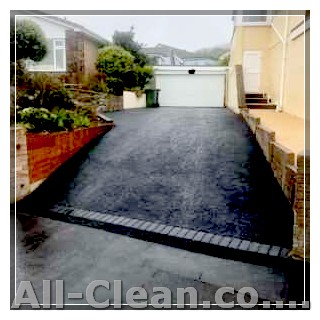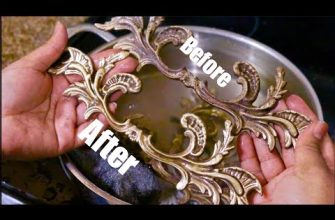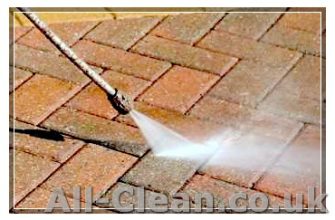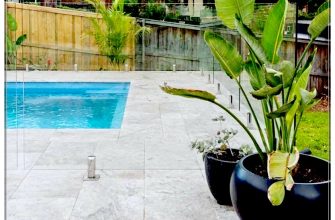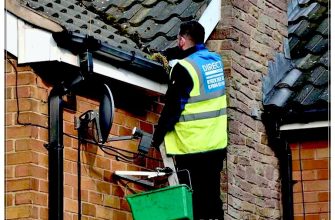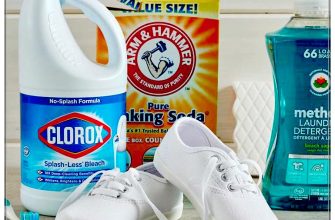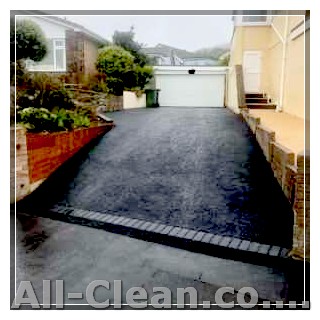
Moss and algae can quickly take over your driveway, making it look unsightly and causing potential slip hazards. However, with the right maintenance and treatment, you can keep your Devon tarmac driveway clean and free from moss and algae.
One of the most effective ways to prevent moss and algae growth on your driveway is through regular cleaning and maintenance. By cleaning your driveway on a regular basis, you can remove any moss and algae that may have started to grow. A soft brush and water are usually enough to do the job, but if the moss and algae are stubborn, you may need to use a mild detergent or vinegar solution to help get rid of them.
If you don’t have the time or equipment to clean your driveway yourself, there are professional cleaning services available that specialize in driveways and can provide a full treatment to get rid of moss and algae. They use softwash techniques that are gentle on your driveway surface but effective in removing moss and algae. By hiring a professional team, you can ensure that your driveway is properly cleaned, and the moss and algae are completely removed.
In addition to regular cleaning, there are some preventative measures you can take to minimize the chance of moss and algae growth on your Devon tarmac driveway. Trimming back any overhanging trees or plants that may provide shade and retain moisture can help reduce the conditions that are favorable for moss and algae growth. You can also apply a moss and algae treatment to your driveway, which will provide a protective barrier and prevent moss and algae from growing.
Another way to keep your Devon tarmac driveway moss- and algae-free is through proper sunlight exposure. Moss and algae thrive in damp and shady areas, so ensuring that your driveway gets plenty of sunlight can help prevent their growth. If your driveway is mostly shaded, you can consider cutting back trees or installing additional lighting to expose it to more sunlight.
- Conclusion
- Tarmac Maintenance
- 1. Regular Cleaning
- 2. Remove Moss and Algae
- 3. Prevent Water Retention
- 4. Regularly Inspect for Damage
- 5. Consider Softwash Treatment
- Boiling Water
- Bleach
- Get Your Devon Tarmac Driveway With iDream Solutions
- Is It OK To Jet Wash My Tarmac Driveway
- Precautions Before Jet Washing
- Jets Washers vs. Biological Solutions
- Conclusion
- Sunlight
Conclusion
Maintaining a moss- and algae-free Devon tarmac driveway requires regular cleaning and maintenance. By following these tips, you can keep your driveway looking clean and well-maintained, ensuring that it remains durable and attractive for years to come. Whether you choose to clean your driveway yourself or hire a professional team, taking these steps will help you keep moss and algae at bay and enjoy a clean and beautiful driveway.
Tarmac Maintenance
Tarmac driveways are a popular choice for homeowners due to their durability and low maintenance requirements. However, over time, moss and algae can start to grow on the surface, making the driveway look unattractive and potentially causing slip hazards. To keep your tarmac driveway in excellent condition, regular maintenance is essential.
1. Regular Cleaning
To prevent moss and algae growth on your tarmac driveway, it’s important to clean it regularly. This can be done using a soft brush or a pressure washer. However, be cautious when using a pressure washer, as it can damage the surface if not used correctly. Instead, opt for a soft brush or a specialized tarmac cleaning solution to avoid any potential damage.
2. Remove Moss and Algae
If you notice moss or algae growing on your tarmac driveway, it’s important to remove it promptly. Use a stiff brush or a pressure washer to scrub away the growths. For more stubborn moss and algae, a tarmac cleaning detergent can be applied, which will break down and remove the growths effectively.
3. Prevent Water Retention
Moss and algae thrive in moist environments, so it’s important to ensure that water doesn’t accumulate on your tarmac driveway. Make sure the surface is properly sloped to allow water to drain away. Additionally, keep gutters and downpipes clear of any debris to prevent water from pooling on the driveway.
4. Regularly Inspect for Damage
Regularly inspect your tarmac driveway for any signs of damage, such as cracks or potholes. If you notice any issues, make sure to address them promptly to prevent further deterioration. Fill in cracks and potholes with tarmac repair solutions to maintain the integrity of the driveway.
5. Consider Softwash Treatment
If you’re looking for a more extensive and long-lasting solution to keep your tarmac driveway clear of moss and algae, consider hiring a professional softwash company. Softwash is a gentle yet effective cleaning method that uses low-pressure equipment and specialized cleaning solutions to remove and inhibit the growth of biological organisms.
By following these tarmac maintenance tips, you can ensure that your driveway remains clean, clear, and free from moss and algae. Regular cleaning and timely repairs will help extend the lifespan of your tarmac surfacing and leave your driveway looking its best.
Boiling Water
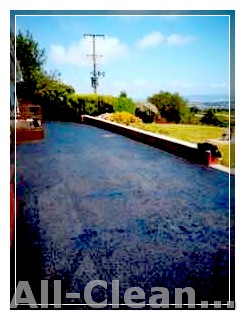
Boiling water is a simple and effective solution for removing moss and algae from your tarmac driveway. Not only does it look great and impart a clean and well-maintained look, but it is also a durable and long-lasting method of removing these unwanted substances.
Prior to using boiling water, it is recommended to treat the affected areas with a softwash or jet wash to remove any loose moss or algae. This will ensure that the boiling water can penetrate the surface properly.
Boiling water can be used on both tarmac and non-porous surfaces, making it a versatile solution for driveways, paths, and even car parks. There’s no need to worry about any damage to the tarmac or other surfaces; boiling water is a safe and effective method of removal.
To use boiling water, simply bring a kettle or pot of water to a full boil. Carefully pour the boiling water over the moss or algae-infested areas, making sure to cover the entire affected area. Leave the boiling water to sit for a few minutes to allow it to do its work.
After a few minutes, you can use a soft brush or a jet washer to remove any remaining moss or algae. In some cases, you may need to repeat the process if there are stubborn patches that have not been fully removed.
It is important to note that boiling water alone may not be enough to completely rid your tarmac driveway of moss and algae. To ensure a thorough cleaning, you may want to consider using a softwash solution or other biological treatments.
For example, a solution made with baking soda and hot water can be effective in removing moss and algae. Simply mix baking soda with hot water to create a paste-like consistency and apply it to the affected areas. Let it sit for a few minutes before rinsing off with water. This can help to further remove any remaining moss or algae.
Additionally, if your tarmac driveway is heavily infested with moss or algae, you may need to explore other treatment options. Some customers have had success with using commercial softwash solutions or hiring professional cleaning services.
It’s also worth noting that moss and algae tend to thrive in damp and shaded areas. To prevent their growth in the future, it’s important to make sure that your tarmac driveway receives ample sunlight and is properly drained.
In conclusion, boiling water is a simple and cost-effective solution for removing moss and algae from your tarmac driveway. However, it may not be a permanent solution, and other treatments may be necessary for extensive or stubborn growth. That being said, using boiling water, in conjunction with other cleaning methods, can help to keep your driveway looking clean, safe, and inviting for years to come.
Bleach

Bleach is a powerful and effective cleaning agent that can be used to remove moss and algae from your Devon tarmac driveway. It is important to note that bleach should be used with caution and proper safety precautions should be followed.
When using bleach, it should always be diluted with water to ensure that it is not too strong. A mixture of bleach and water can be treated as a clear solution. Bleach can impart damage to the driveway if used in its concentrated form.
The bleach solution should be applied to the affected areas of the driveway and left to sit for a short period of time. The sunlight will help to activate the bleach and allow it to work its magic. Once the recommended amount of time has passed, the driveway can be rinsed clean with water.
It is important to note that while bleach is an effective solution, it should not be used on all surfaces. Some areas, such as parks and driveways, may require a softer wash. This can be achieved through the use of a softwash system, which uses a gentle detergent solution.
Another alternative to bleach is the use of baking soda. Baking soda can help to remove moss and algae from the driveway and keep it looking clean. It can be sprinkled onto the affected areas and left for a short period of time before being rinsed off with water.
If you’re looking for a more high-tech solution, there are also tarmac treatments available that can help to keep your driveway moss- and algae-free for longer. These treatments come in the form of sprays or liquids that can be applied to the surface of the tarmac. They work by creating a protective barrier that prevents moss and algae from taking hold.
In conclusion, bleach is a great option for cleaning moss and algae from your Devon tarmac driveway. However, it should be used with caution and proper safety precautions should be followed. If you prefer a gentler approach, there are other solutions available such as baking soda and tarmac treatments. Ultimately, it’s up to you to choose the method that works best for your driveway and ensures it stays clean for longer.
Get Your Devon Tarmac Driveway With iDream Solutions
If you’re looking for a new driveway or need treatments for your existing surfacing, iDream Solutions is here to help. Our team of experts has years of experience in providing high-quality solutions for customers in Devon and surrounding areas.
When it comes to maintaining your driveway, it’s important to keep moss and algae at bay. These growths can make your driveway look unattractive and can also cause damage if not properly treated. That’s where iDream Solutions comes in.
With our range of effective treatments, your tarmac driveway will stay clean and clear all year round. We use solutions, such as soda wash and Cleanze, that are specially formulated to remove moss and algae and prevent their regrowth. These treatments are non-porous and do not leave any harsh effects on your driveway.
To ensure that your driveway stays moss- and algae-free for longer, we also recommend regular cleaning. This can be done by using water and a soft brush or by using equipment that we provide. Our team can cover all the areas that need to be cleaned and make sure that the entire surface is properly treated.
For more extensive moss and algae growths, we may use bleach or other heavy biological solutions. However, these are only used in specific cases and under our team’s expert guidance.
So, if you want a clean and moss-free driveway, turn to iDream Solutions. Contact us today to explore our range of services and get your Devon tarmac driveway looking great again.
Is It OK To Jet Wash My Tarmac Driveway
When it comes to maintaining your tarmac driveway, one question that often comes up is whether it is safe to jet wash the surface. Jet washing, also known as pressure washing, can be an effective method for cleaning various surfaces, but is it suitable for tarmac driveways?
Jet washing can be a clear option for getting your tarmac driveway cleaned and looking like new again. It is a thorough and efficient way to remove dirt, grime, moss, and algae that may have accumulated over time.
However, there are a few factors to consider before deciding to jet wash your tarmac driveway. Tarmac is a durable and long-lasting surfacing solution commonly used for driveways and parking areas. While it is generally resilient, it’s still important to take precautions when cleaning it.
Precautions Before Jet Washing
1. Remove Loose Debris: Before using a jet washer, make sure to remove any leaves or other debris from the surface of your driveway.
2. Soft Brush Cleaning: If there is moss or algae on your tarmac driveway, it’s usually best to first treat the area with a soft brush. This helps ensure that any loose growth is removed and that the jet washer can be more effective.
3. Use Soft Water: Using boiled water or warm water with a mild cleaning solution can help to soften tough dirt and make it easier to remove when using the jet washer.
4. Dilution and Spray Distance: When using a cleaning solution, be sure to follow the manufacturer’s instructions for dilution and spray distance. This will help to avoid any damage to the tarmac surface.
Jets Washers vs. Biological Solutions
While jet washing can be effective, some customers prefer to use biological solutions or bleach to treat moss and algae on their tarmac driveways. These solutions are often used before jet washing to help break down and kill any remaining growth.
If you choose to use bleach or another chemical solution on your tarmac driveway, make sure to apply it carefully only on the affected areas. Avoid applying it to the entire driveway to prevent any extensive damage.
It’s worth noting that jet washing alone can often be enough to remove moss and algae without the need for additional chemicals. However, if moss and algae persist after jet washing, it may be necessary to explore other options.
Conclusion
In conclusion, jet washing can be a great way to maintain a moss- and algae-free tarmac driveway. However, it’s important to take precautions and follow the recommended guidelines to prevent any damage to the surface. Before jet washing, remove loose debris, use a soft brush to treat moss and algae, and consider using hot water with a cleaning solution for better results. If other solutions are necessary, be cautious and only apply them to the affected areas. By following these tips, you can keep your tarmac driveway clean and in great condition for years to come.
Sunlight
Sunlight plays a crucial part in the maintenance of a moss- and algae-free Devon tarmac driveway. Not only does it provide natural heat and light, but it also helps to prevent the growth of moss and algae. Sunlight helps to dry out any damp areas, making it difficult for moss and algae to thrive.
If your driveway is heavily shaded and doesn’t receive much sunlight, there are a few things you can do to mitigate the effects. One option is to trim back any overhanging trees or bushes to allow more sunlight to reach the surface. Leaves and debris from these plants can create a mushy environment ideal for moss growth.
Another solution is to use a pressure washer or softwash equipment to remove any moss or algae that has already appeared. These tools can be effective in removing the growth and restoring the clean appearance of your driveway. However, be cautious when using a pressure washer, as using too high pressure or getting too close to the surface can damage the tarmac.
If there’s still an issue with moss and algae after trying the above methods, there are also moss and algae cleaning solutions available on the market. These solutions usually contain chemicals that can help kill and prevent the growth of moss and algae. Before using such solutions, it’s important to carefully read the instructions and follow them to ensure proper usage and safety.
One popular and environmentally friendly homemade solution for removing moss and algae is a mixture of vinegar and water. This solution is non-toxic and can be used to spray the affected areas. Just mix equal parts of vinegar and water, apply it to the moss or algae, and then scrub the area with a brush. Rinse with clean water afterward. Remember to protect your skin and eyes while working with this solution.
While sunlight and cleaning solutions are effective in maintaining a moss- and algae-free driveway, regular maintenance is key to keeping your tarmac looking great. Sweep off any debris, leaves, or dirt from the surface regularly. If you notice any moss or algae growth, take immediate action to remove it. The longer you leave it, the more difficult it may be to clean and the more damage it can cause to your tarmac.
In summary, sunlight helps to prevent moss and algae growth on tarmac driveways. Trim back any overhanging trees or plants to allow more sunlight to reach the surface. Use a pressure washer or softwash equipment to remove moss and algae, but be cautious not to damage the tarmac. Additionally, there are commercial cleaning solutions available, or you can try a homemade solution using vinegar and water. Regardless of the method you choose, regular maintenance is crucial to keep your tarmac looking its best.
